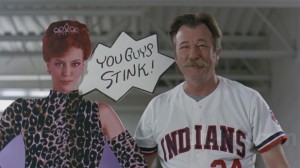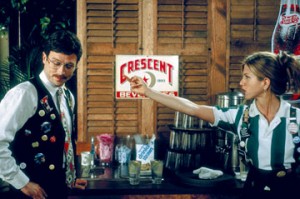Pirates manager Jim Leyland took issue with the team’s We Play Hardball promo. “We can’t say we play hardball, I’m tired of that bleep,” he said.
—Peter Gammons, Sports Illustrated, June 9, 1986
Adam Wainwright gave the Cardinals everything they could have asked for Sunday night: a 107-pitch complete game victory [1]. John Maine gave the Mets everything they could have asked for: five innings, 115 pitches, not putting victory hopelessly out of reach too early.
The Mets don’t ask for much — and they don’t receive it very often. But this time they got exactly what they were looking for. An experienced baseball man in the team’s employ eagerly anticipated the Mets losing two of three this weekend, and he got what he said he wanted.
I unleashed a steady stream of expletives in the latter half of the Saturday marathon as well as all kinds of incorrect predictions (of the “oh god, we’re gonna lose right here” nature) and certain declarations that never had a chance of holding up in any fan court of law. During whichever extra inning it was when we couldn’t seem to do anything right before we actually did, I declared, “IF WE LOSE, I GIVE UP!”
Which, of course, was silly. I knew it was silly so quickly that I immediately recanted it. C’mon, I thought, if I haven’t given up over these past few years, why would I give up now?
The Mets didn’t give up on Saturday, which was truly to their credit, considering the man who ostensibly makes the decisions that affect them most kinda, sorta gave up on them Friday.
One of the underlying drags on my fandom since 2007 has been the tendency of the Mets organization — though we probably shouldn’t assume they’re organized — to overstate their competitive excellence. While they were proving unprepared for all comers, their brochures insisted prematurely that Our Season Had Come. When the Collapse of 2007 was resonating clear to the Echo Collapse of 2008, Mets management treated both colossal catastrophes as aberrations in deference to the partial success of 2006. And when all unraveled on the field in 2009, the bad play wasn’t the thing; it was just bad injured luck.
The Mets’ losing is unfortunate, but the Mets institutionally preening while in the act of losing has been the grating part. Even allowing for marketing campaigns that will, by necessity, play up a product’s attributes over its drawbacks, the face put on Mets baseball was surely akin to the one Nero wore while furiously working his Charlie Danielsesque fiddle [2]. Flushing is burning? We’re having Ash Day! (First 25,000 fans only.)
I once worked with an advertising salesman whose credo was, “Underpromise and overdeliver.” Do the opposite, he said, and you’ve got grumpy customers. When the Daveotronic 5000 robotically insists the Mets are World Series-bound [4], it’s a bit of a turnoff, no manner how kindly the Daveotronic’s sound chips are programmed. When pamphlets hawking season tickets suggest a Belief in Comebacks [5] and nothing more, that’s easier to digest. From a 70-92 mudhole, the most nominal of comebacks would require only 71 wins and your minor league honcho keeping his shirt on. Leave the “postseason option” bait for the fine print until such an enticement proves operative.
Better yet, just hang out that GAME TO-NITE sign and we’ll figure it out from there.
If you’re gonna sell us fertilizer, I’ve been thinking since the Mets went to seed, don’t grin and tell us its top-grade Soilmaster, y’know? If you’re not gonna play baseball like it oughta be, don’t pretend that’s what you’re gonna do. I’m not talking about advertising campaigns per se. I’m talking about your general portrayal of what you’re putting out there. If you can’t legitimately say you’ve got a great team playing great, then, really, just say we’ll sure try to win. Failing that, say nothing at al.
“This is an era of limits and we all had better get used to it.”
—California Governor Jerry Brown, 1975
The same advice would hold true when reality and despair merge into a year like this to date. For example, if the team for whose performance you are responsible is not on a roll, but is at least on a one-game winning streak as it was following Thursday’s feelgood finale in Colorado, don’t bring everybody down by telling a widely read national baseball writer the following [6]:
“St. Louis is always tough. If we can win two out of three, that will be outstanding. If we win one, I’ll take it.”
For the love of Mike Birkbeck [7], don’t do that. Don’t, if you are Omar Minaya, tell Jon Heyman of Sports Illustrated that sweeping a three-game series in April is off the board and that simply not being swept is an acceptable outcome.
It was too late, as Ray Stevens might have put it [8]. We’d already been incensed [9]…and still have yet to experience a streak that involves anything but losing.
Think it all you want, but don’t tell Jon Heyman, because Heyman’s gonna tell us, and boy is it gonna bring us down to new depths we had yet to contemplate nine games into this rapidly hollowing season. We may think it, too, but we don’t know it for sure, and we sure as hell don’t wanna hear it from you.
We don’t really wanna hear much from you, Omar, beyond, “I want to spend more time with my family” at your reluctant resignation press conference. As much as I don’t want you to BS me, as you did via Heyman, about how awesome your 3-6 (soon to be 4-8) Mets will be as soon as Murphy and Beltran and the ghost of Iron Man McGinnity come off the DL, I don’t need you to think out loud that the Mets seemed capable of no more than one win in three against the Cardinals this weekend.
They’re the Cardinals. They’re not the Popes. They’re not supposed to be infallible. And in baseball, no one is so sinfully terrible that they can’t conceivably win a series from a team with a better record. Not even the 2010 Mets, who are being positioned internally less like the best-compensated roster in the National League [10] and more like a 49th-year expansion team.
We’ll take it if we can win one out of three in St. Louis, Omar said. Jerry Manuel, meanwhile, told Brian Costa of the [11]Star-Ledger [11]before Friday’s series opener [11] that if the Mets are still “in the game” when Ollie leaves, he’d consider it a good outing. Nice to read such confidence emanating from the manager. FYI, Iron Man McGinnity completed 44 of 48 starts for the 1903 Giants, and I’m guessing John McGraw expected nothing less…and I’ll bet Tony LaRussa was looking for nine from Wainwright Sunday the way Davey Johnson counted on Rick Aguilera to do the same — which he did — on July 5, 1985, the game after that famous 19-inning marathon in Atlanta.
The Mets seem to be about cutting slack, so I’ll attempt to do the same, a bit, for the general manager and manager by acknowledging it’s a long season, and there are a clutch of reporters following Omar and Jerry around at all times with notebooks and tape recorders for just about every day of it. It’s an unnatural situation, but it exists in baseball. Over the course of Spring Training, 162 games and Hot Stove gatherings, people will say things (such as “how do you get a job in baseball?” per Adam Rubin). Not all of it should be taken literally. It gets tiring out there on the road, I imagine. You must think out loud a lot, sometimes before you think to yourself. You just find yourself saying what wouldn’t make sense to you if it was placed before you in script form. I’ll bet Omar Minaya would question a cue card that instructed him to tell a high-profile media member that he’d be satisfied by his team losing two of its next three games.
Omar can’t possibly be as clueless as he comes off. But he does tend to repeatedly come off that way, and he did again. He admitted winning one of three this weekend would be all right by him. You can take that as an inadvertently articulated realistic assessment of having to face Chris Carpenter and Adam Wainwright in two of three games, or you can be aghast that the general manager of a sports team is writing off two of three games before they’re played.
Most things in this life aren’t measured in terms so simplistic that they can be chalked up as either wins or losses. Yet in baseball, that’s exactly how things are measured. You win or you lose. There’s room for nuance and big pictures and all that, but eventually, there are wins and there are losses. That’s all that gets measured in the standings, and the standings are all that determine your success. Omar Minaya said, whether he meant to be so forthcoming or not, that he would take losing two of three games in St. Louis.
And I’m sure he took it well.
As for Jerry, I don’t know. Last Saturday, after the ninth inning during which few cheered without electronic tickler [12], I told my friend Joe that the good thing about this upcoming road trip was if the Mets do badly, it will help get Jerry fired. Then I thought for a moment (albeit with no recording devices to take down my clarification) and amended that sentiment:
“Or they could win some games and it would mean Jerry is a good manager.”
If we follow the McCarver memorandum that no team’s as good/as bad as it looks when it’s winning/it’s losing, we have to apply that lesson to managers. When Jerry Manuel blew in as a breath of fresh air in June 2008, and the Mets started to reel off victories a few weeks later, man, could Jerry Manuel manage. Everything he said was deep or funny or both. He was gangsta and we were his happy homies.
Now and again, there’s a flash of whatever it was that made Jerry Manuel appealing beyond his not being Willie Randolph. During Friday’s PIXcast, Gary Cohen explained how Jeff Francoeur’s batting eye became his taking eye. Manuel asked him what pitch he’d want if the seventh game of the World Series was on the line and he was at the plate. Jeff showed him. OK, Jerry said, and proceeded to throw him BP with the caveat that he only swing when he gets his dream pitch. Next thing you know, Jeff Francoeur’s on-base percentage, before Saturday’s baseless game, is .535. I’d like to believe the same man who can get through to baseball’s most notorious free swinger has more on the ball than threatening to bat Jose Reyes third and actually batting Frank Catalanotto fourth.
Omar’s greatest attribute is sometimes he hasn’t been wrong about a player. Jerry’s greatest attribute may be a future in sports psychology. But neither is burning it up in his present position and neither is helping his cause by saying whatever pops into his head. “First, do no harm,” Hippocrates wrote in Epidemics, and there’s been a rampant epidemic of harmful Met stupidity already this season.
“It’s the classic Washington scandal. We screwed up by telling the truth.”
—C.J. Cregg, “Dead Irish Writers,” The West Wing
Win one of three? What did that mean once 20 ridiculous innings had been put in the books Saturday? That the Mets could follow Keith Hernandez’s example and hop the early plane back to New York Sunday morning? Fellas, Omar said we can take a personal day! Whatever happened to the fine example set by Cleveland skipper Lou Brown in Major League wherein he’s calculated it’s going to take 32 wins to clinch the division [14] and with each Tribe triumph and pledges they’ll peel off 32 dress segments to stick it to their doubting hussy of an owner? In the Omar-directed remake of the movie, the Mets would remove one swatch of fabric and return numbly to their slumps.
“No,” Omar might tell Jennifer Aniston if he filled in for Mike Judge as her Tchotchkes supervisor in [15]Office Space [15]. “Fifteen pieces of flare, the bare minimum, is adequate. Just serve one of the next three meals and you can knock off early.” Too bad the Marlins didn’t alight at Shea the final weekends of ’07 and ’08 with the Omar attitude. We’d probably have two more banners in our museum right now.
The general manager said one of three would be fine. I sure hope that means tickets at Citi Field will be two-thirds off next week. And that Omar Minaya has to buy one if he wants to see the Mets.
Brent Gaff [17] is what happened to the 1982 Mets. The other kind of “gaffe,” Michael Kinsley once wrote, “is what happens when spin breaks down,” but it’s not simply semantics at stake here. It’s the leitmotif of the current Mets to act as if just enough is enough. I couldn’t help but remember, as he circled the bases after his grand slam off Raul Valdes, that Felipe Lopez sat on the open market forever before the Cardinals snapped him up. You gonna tell me the Mets couldn’t have used a middle infielder/relief pitcher with some pop? Re-signing Alex Cora, heretofore hidden first base talents notwithstanding, was just enough. Felipe Lopez was more than enough. But just enough is apparently enough.
Just juggling the same question mark pitchers is just enough, so that’s enough. Just handing pre-designation Mike Jacobs a couple of dozen at-bats and Fernando Tatis a couple of dozen more is just enough, so that’s enough. For all we know, Tobi Stoner replacing Jacobs on the roster is just enough, and Ike Davis will continue to refine his home run swing in Buffalo.
Oliver Perez reaches the seventh and allows a baserunner his shortstop could have thrown out? That’s enough, Ollie. You’re working on a shutout (at last), but make way for relief. Mets lose by one run for the second time in three days? That’s close enough, seems to be the feeling. I keep hearing Jerry Manuel asked about the Mets having been in the game right to the end and Manuel doesn’t reflexively remind Ed Coleman that you play to win the game. He doesn’t dispute the moral victory theory at all; he brought it up again Saturday with Tim McCarver and Kenny Albert, deluding himself that one-run losses represent progress. Hours later, he’s instructing Luis Castillo to sacrifice-bunt against Joe Mather. It’s not a far descent from there into Art Howe “we battled” territory.
A balance can be struck between overblown hype and diminished expectations. The Mets haven’t found it. They’ve gone from chest-puffing to poor-mouthing. It’s no more comfortable a place than this start has been. Then again, living in last place is rarely an easy fit.


